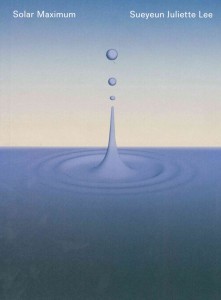Book Review
 Sueyeun Juliette Lee’s Solar Maximum turns poetry into a vertiginous exploration of futural horizons and the nodes of futurity within our temporally uneven present.
Sueyeun Juliette Lee’s Solar Maximum turns poetry into a vertiginous exploration of futural horizons and the nodes of futurity within our temporally uneven present.
Lee’s book moves between prose vignettes and wiry flights of Latinate language. In this we find neither dystopia nor utopia, but rather a bundle of relations darting between the familiar and unfamiliar:
Her break with her family is simultaneous with an off-shore explosion that jettisons hundreds of millions of dollars worth of robotics into the sea. Submarine dogs converge in a hungry swarm. A baby is born in a dark, damp room meant to simulate a forest.
Reading these poems is to be gripped by the uncanny: they’re strange and familiar. We might know this has never happened, but when we look at the component parts, we might think, “Why hasn’t it?” Writing poetry like this is a highwire act; otherwise, we could simply pump a book full of odd juxtapositions and call it an attempt to see what’s new. But Lee’s poems are anchored in a present some may find as strange as fiction. We see an early, judicious reminder of this in “we kept playing until we could barely see things”:
Memories from his detention at Jixi
re-education-through-labour camp in
Heilongjiang province still haunt Liu.
As well as backbreaking mining toil,
he carved chopsticks, toothpicks out of
planks of wood
assembled car seat covers
memorized communist literature to
pay off his debt to society.
By night, he was forced to slay demons,
battle goblins and cast spells
What’s described in this poem is the figure of Liu being forced to play an online role-playing game to grind a character up in levels high enough to sell for real dollars. Lee asks us to consider the bleakest effects of the value of economies of virtual play worlds surpassing those of entire meatspace countries. Indeed, the games through which we produce our visions of futures made of sweet, digital light may themselves be built on half-hidden relations of ongoing, old-fashioned exploitation.
And if the previous passage seems distinctly narrative, just wait: a poem late in the collection is all signal no content: a string of dashes strung across the page. Some readers will find this irritating, but Lee’s poems aren’t going to apologize. They announce they want to “Make us communicate with ourselves aided by a new diction”. Here’s a sentence in which syntax makes its diction perform in strange ways: “Underwater sharks make stop motion resemble perfect symmetry, forecast summer into the lumps behind the gauzy pale between.” If you’re not interested in trying to track the subject (or dissolution of the subject) in sentences like this, the book may not be for you. However, as a reader, I consistently found that the poem provided enough oxygen to make these dives into unfamiliar language meaningful. The body, for instance, is here, making palpable what might seem like empty air:
My skin crawls at odd hours of the day, a residual effect of my recent radiation therapies, how they inadvertently synced me to coronal flares. A simple turn transforms into an avalanching pinprick of tremors one millimeter thick.
And if there is sometimes dread in the poem’s descriptions of the body as porous—bathed in radiation, distributed across several virtualities—there’s sometimes sheer delight in the poem’s re-descriptions:
As a child, I had several dogs. Blackie, a fierce mountain forest of deep ravines and the wet creeks that bled through them. Blackie with dazzling starfruit teeth.
Why end this review with Blackie? The tradition of English poetry has seen its fair share of Jeremiah’s forecasting the end of a corrupt order—who see the present as wastelands and futures restorations of some original. Lately, Christian Bök has attempted to write a poem in a chemical alphabet and inject it into bacteria that will survive human extinction. This seems futuristic enough, yet the poem itself is soaked in the language and registers of the Greek epic. It’s a distinctly Noahic project—finding an ark to preserve some original code. But why can’t poetry represent the future without symbolically destroying the present? Perhaps we need poets of the future who see poetry as an extension of the present, not its annihilation. Lee is one such poet, just as capable of describing the conditions upon which human existence depends in a clinical string of “if” statements as describing Blackie the good dog in the language of the future. Solar Maximum is a new and necessary kind of triumph.
About the Reviewer
Joseph Hall is a writer, scholar, and a founding member of the bookmaking collective Hostile Books. Black Ocean publishes his collections of poetry. He lives in Buffalo, NY.